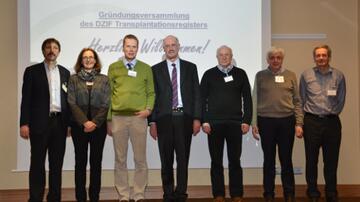Transplant Cohort
Medical data and biological samples obtained from transplant patients are collected and managed across Germany with the help of the DZIF Transplant Cohort. The data and samples form the basis of scientific studies which investigate the connections between numerous factors influencing an organ’s susceptibility to infection and organ function. In June 2024, 2,700 patients were included in the database—with 40,185 blood samples and 12,669 other samples such as urine or stool.
The DZIF Transplant Cohort specially focuses on patients who have received a donor organ or a stem cell transplant.
Background
Donor organ recipients are dependent on drugs throughout their life so as to prevent rejection of the transplanted organ. These immunosuppressant drugs protect the organ but partially weaken the body’s immune response, thus leading to an increased susceptibility to infection. Pathogens therefore pose a particular threat to organ recipients. Stem cell recipients also initially have significantly impaired immune systems due to both their underlying illness and the treatment.
Infections therefore occur more rapidly than usual and can lead to complications. If an organ has been transplanted, infections can impair organ function and, in the worst case, lead to failure of the new organ.
A patient’s individual risk of developing complications depends on many different factors. The better the relationships between the type of transplant, pre-existing illnesses, medication and infections are understood, the more effectively prevention, diagnosis and treatment can be implemented in practice.
DZIF Transplant Cohort
- Structure
The Transplant Cohort is a registered non-profit association. Its members include participating transplant hospitals and scientific establishments and are represented by an elected Executive Board. Upon request, data and samples of the cohort can be released to research groups. These applications will be reviewed by a Scientific Executive Board supported in part by external reviewers. The board members are elected at general member meetings and generously support the cohort in an honorary capacity.
Other DZIF and external partners:
- DZIF infrastructure Bioresources, Biodata and Digital Health
- Bitcare GmbH
- Data and samples
The Cohort Database forms an essential part of the Transplant Cohort and was developed by the Institute of Medical Statics and Epidemiology of Klinikum rechts der Isar in Munich. It is currently being managed by Bitcare GmbH.
This database is made up of a collection of information that provides insight into the individual risk of infection for transplant patients. This includes details of pre-existing illnesses, existing infections, the course of transplant, drugs used and any new infections.
Biomaterial obtained from transplant patients constitutes a further important basis for future studies. Biosamples obtained additionally in the course of routine treatment of the patients are used. Close cooperation exists in particular with the DZIF Biobanking unit within the new infrastructure Bioresources, Biodata and Digital Health, which ensures the creation and regular revision of standardized work instructions. This ensures comparability of quality, as all biosamples are obtained and processed in the same way at all centers. In addition, internal audits are regularly carried out by the Biobanking unit to ensure and check the high quality of the biosamples and the processes.
- Ethics and data protection
An ethics and data protection concept was devised and approved by all participating establishments and revised according to the new General Data Protection Regulation. Cohort participation is only possible with a patient’s informed written consent.
Participating university hospitals each have individual access to the database limited to the hospital’s own patients. Data for further processing are provided in pseudonymised form only.
The biosamples are also stored and processed in pseudonymised form. Besides documentation in the Cohort’s database, the biosamples are also included in the DZIF’s central biosample registry.
- Information for applicants
The transplant cohort provides medical data and/or biosamples to interested research groups or physicians upon request. The prerequisite is a research question that deals with the concerns of transplanted and immunocompromised patients.
The transplant cohort has been collecting medical data and biosamples from patients who have undergone kidney, liver, pancreas, heart or stem cell transplants since 2015. Basic patient data and biosamples are collected at the time of transplantation and, if possible, after a further three, six, nine and twelve months as well as annually after transplantation. Special emphasis is placed on the documentation of medication and infections that have occurred.
When planning a study, you can see which biosamples are generally available and what type of infections have been documented in the cohort on our daily dashboard: https://imse.dzif.imse.med.tum.de/m4export/jsp/export/frame.html
If you are interested in a study based on the resources of the transplant cohort, please contact Dr. Daniela Schindler or write to application.tx-kohorte@dzif.de.
For a more detailed insight into the documented data, you can also obtain access to the test database.
In preparation, you are welcome to view and download relevant documents in advance. Firstly, you will be asked to submit a pre-application, which will be discussed within the Scientific Steering Committee. You will then receive feedback, on the basis of which you may submit a full proposal. Depending on the type of application, external reviewers will be consulted.






